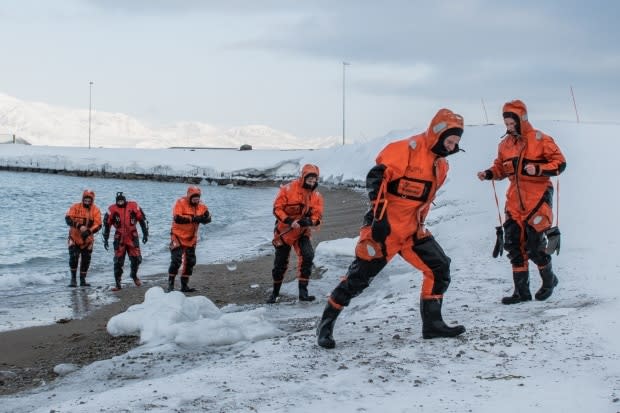Women on Arctic research mission told not to wear tight-fitting clothing
A prominent Arctic research mission is coming under fire for a dress code policy that has highlighted concerns about systemic sexism in the polar sciences.
The MOSAiC expedition, an international research mission led by Germany's Alfred-Wegener-Institut, had polar researchers navigating Arctic sea ice for a full year collecting data about the Arctic climate and climate change.
But shortly after the journey began, women on board a support vessel for the mission, the Akademik Fedorov, were told they could not dress in tight-fitting clothing due to safety concerns.
Journalist Chelsea Harvey was on board the ship for six weeks in October 2019 when the policy was first disclosed. She recently wrote about the rules for energy and environmental research trade publication E&E News.
Halfway through her voyage, she said, passengers were told that "thermal underwear" was prohibited as outerwear in common areas. The next day, Harvey said the mission's leaders elaborated to say that "no leggings, no very tight-fitting clothing — nothing too revealing — no crop tops, no hot pants [and] no very short shorts" would be allowed.
"We were told there are a lot of men on board this ship … and some of them are going to be on board this ship for months at a time," Harvey told CBC News. "In my meeting … what we were told was this was a 'safety issue.'
"It definitely sparked a lot of alarm and confusion at the beginning. Everyone was sort of wondering, was there some sort of incident that triggered all of this?"

Discussion of clothing policy followed sexual harassment
In fact, as Harvey later confirmed with the Alfred-Wegener-Institut and the mission's chief scientist, Thomas Krumpen, there had been allegations of sexual harassment aboard the Akademik Fedorov days before the policy was discussed.
Several female participants reported they'd been harassed by a group of men on the ship, including technical contractors, Harvey reported. They told Krumpen, which resulted in some members of the crew being prohibited from contact with several women on board.
Krumpen told Harvey that the clothing policy had "no temporal and substantive connection, any connection, with a specific incident."
Reached by CBC, the Alfred-Wegener-Institut said in a statement that a clothing policy was always in effect and was communicated to passengers "independently from the incident."
"The policy is intended to ensure both adherence to standards of hygiene and occupational safety … as well as mutually respectful conduct," the institute said in a statement.
"Throughout the MOSAiC expedition, the clothing policy's importance and its applicability to everyone on board were repeatedly emphasized," the statement continues. "Following violations of the policy on the part of individual persons on board the … Akademik Fedorov, the cruise lead explained the policies once again."
The day after those meetings … there was this dramatic transformation on board. - Chelsea Harvey, journalist on board Akademik Fedorov
The institute could not provide CBC with a copy of the clothing policy, and the code of conduct distributed to all on board makes no mention of clothing.
But the institute did say "clothing policies may reflect specific regulations issued by a given ship's owner and commanding officers." It's not clear which policy prohibited fitted clothing.
Harvey said that when discussed halfway into the support ship's six-week journey in October, the policy came as a surprise to those on board the Akademik Fedorov.
"We're already here," she said. "We can't go out and buy new clothing."
The next day, there was a "dramatic transformation" on board, she said.
"Everyone came out wearing the one pair of jeans that they brought," Harvey said.
"It just triggered a lot of widespread resentment, this idea that women should have to be responsible for managing the behaviour of men."

Sexism widespread in polar science: expert
"It's totally unsurprising that women were horrified," said Meredith Nash, a sociologist specializing in sexism in science at the University of Tasmania in Australia.
"The assumption that … if a woman wears something fitted, then … she's inviting harassment — that's just so, so gross."
Sexism, of both an overt and systemic kind, is widespread in the science and technology fields. Multiple studies show that women face discrimination and harassment in the polar sciences specifically, especially during field studies like the MOSAiC mission.
Nash said in one study she performed, 60 per cent of female polar scientists she interviewed said they had experienced harassment at some point in their careers, usually while in junior positions.
It just seems like there were so many missteps in the process of what happened there. - Meredith Nash, University of Tasmania sociologist
Women were barred from many polar research missions until "well into the '80s … because they were told we don't have facilities for you, or you're going to be a distraction to the men," she said.
Even today, the division of labour on board polar research vessels usually breaks down in highly gendered ways, with women "tasked with domestic duties" and excluded from field work, she said.
Harvey documented instances of this at the MOSAiC School, the expedition's training program for polar scientists, in her reporting for E&E.
Nash said the decision to discuss the clothing policy after an incident of sexual harassment was a "knee-jerk, reactive [response] to blame it on the women … [instead of] a problematic workplace culture."
"It just seems like there were so many missteps in the process of what happened there," she said.

Clothing policy still in place, but communicated earlier
The Alfred-Wegener-Institut (AWI) told CBC in its statement that it took complaints about the clothing policy "very seriously."
"In order to avoid future misunderstandings … pre-expedition communications with participants were expanded" to include clothing policies.
"The preparations for AWI expedition leaders were also intensified to help them sensitively handle and resolve the conflicts and misunderstandings … and, if necessary, to take appropriate action in response," the statement reads.
Harvey said the incident shows why more women must be in leadership in the polar sciences. Nash said it should spur a broader reckoning with the workplace culture aboard research vessels.
The MOSAiC mission is set to wrap in October. At the end of her six weeks aboard the support ship, Harvey said she left the experience feeling disappointed.
"Women go on these expeditions because they're there to work and do their jobs … and it's a shame these kinds of issues still come up."


